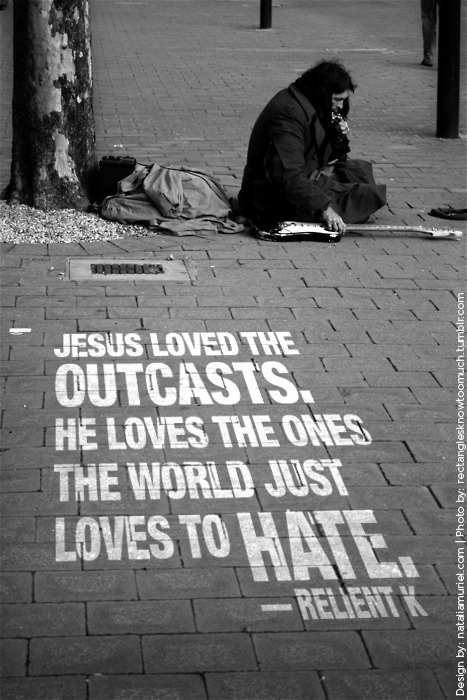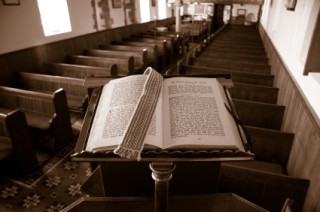What a wonderful example of what biblical church is all about!
Category: Church (Page 2 of 2)
 As we come to another Australia Day and thank God for the public holiday, I think it would do us well to have a read of a couple of very good articles decrying the fact that we generally live in a nation of self-centred idiots.
As we come to another Australia Day and thank God for the public holiday, I think it would do us well to have a read of a couple of very good articles decrying the fact that we generally live in a nation of self-centred idiots.
Writing in the Sydney Morning Herald this week, Sam de Brito pointed out that “The ancient Greek word idiotes, from which the English version is derived, meant “one who put private pleasures before public duty and who was, for this reason, ignorant of everything that mattered”.
Is that the general perception you get when you watch commercial television in this country and listen to our political leaders spout three-word slogans? De Brito goes on to say that, in ancient Greek society, “the famous Greek statesman Pericles is recorded as saying: “We do not say that a man who takes no interest in politics is a man who minds his own business; we say he has no business here at all.”
In the last decade or so, Australians have become very cynical of our politicians. And generally for good reason. Question Time in our Parliament is shown on overseas news networks as an example of the abuse and name-calling that a nation’s elected leaders can stoop to.
The other article that came to my attention was Corinne Grant’s piece in The Hoopla, pretty much saying the same thing as Sam De Brito. Calling to mind our tendency to want to pacify ourselves with mindless pleasures while the world goes to hell in a handbasket, Grant, in her own comedic way, gives the example of satirising our phobia of asylum seekers by saying “The sooner we send ‘em back to get killed in their own country, the sooner we can stop worrying about them taking all our car parking spots at the supermarket.”
Have we become a nation of self-centred morons who passively sit back in our comfy chairs and blame asylum seekers for causing us all this trouble as we flick the channel over to the next episode of Million Dollar Minute? While of course we can’t label all of us in this way, it is a general perception of many Australians that we just don’t care about asylum seekers, what’s happening in Syria, or anything that has to do with what really matters in life, as long as I’m alright.
So what’s with this selfishness? How can we be so blind to the genuine needs of others and so gullible, so unthinking, about what we are told by our media and politicians? I see it as largely about protecting a way of life. Twice in recent years, Credit Suisse has voted Australia, per capita, as the richest nation in the world. No one wants their comfortable way of life threatened, and as long as “I’m alright Jack”, I don’t really want to know about the bad news I see on TV.
When we are so rich, we can easily become blinded to the difficulties of people outside our circle of reference. And when the media encourages this attitude by furthering our demonization of people groups such as asylum seekers and outlaw bikers, an unthinking populace tends to go along with it.
Our political leaders are equally culpable. Our most recent Federal Election campaign was characterised by its negativity and lack of genuine policy discussion. And we the people have become numb to it. So, when our Prime Minister refers to the complex situation in Syria as a war between “goodies and baddies,” we barely bat an eyelid. After all, we’ve just thrashed the Poms in the cricket. That’s what really gets our adrenalin pumping.
Our comfortable lifestyle is also a result of our history since European settlement. We are a nation that has never had a civil war (you could say there was one against our indigenous people but that’s more genocide than civil war, and that’s another story), and we are not bordered by a host of other nations like Europe is.
People often question why Europe has had so much conflict over the years. Why can’t they just get along and stop fighting each other? When you consider the fact that most conflict is over issues of land, you can see why the fact that there are so many different nations and cultures in Europe has fed so much conflict. That plus the fact that some of those conflicts go back centuries, a good deal longer than the history we have known since European settlement. In contrast to Europe, we are a nation surrounded entirely by coastline – “girt by sea” as our national anthem puts it.
Our love of pleasure while trying to ignore those aspects of life that make us who we are is a reflection of a lack of a sense of what we think life should be about. It was 25 years ago this year that John Smith wrote his magnificent Advance Australia Where? (different to Hugh Mackay’s more recent book of the same title). Smith’s book was a brilliant analysis of why a country with such material riches has such a tragic rate of social statistics. The tagline of the book was “a lack of meaning in the land of plenty.” That said it all then and it says it all today.
I am convinced that meaning lies only outside of ourselves. The more we look for life inside ourselves and in the idea of “individual freedom” as it is thrown at us by popular culture, the more we are sucked into its vortex and the more we lose a sense of who we really are. What I have found through living life with its associated consequences, good and bad, is that real meaning and ability to cope with the vagaries of life is only found in following Jesus of Nazareth. Jesus lived in a culture that was in some ways very different to ours, but in other ways was very similar. People in 1st century Palestine wanted their good life just like we do.
The way Jesus handled this desire in people was not to criticise them for having the desire, but to accept them for who they were as people while pointing out better ways to live the good life. If we want to be first, he said, be first at serving. If we want riches, seek riches in heaven. That will give us what we are really after.
Thankfully the church in Australia is talking a lot more these days about issues of meaning and identity. Churches run courses on depression, addiction and other critical life issues. Despite the dumbing down that we generally see in popular culture, many Australians are searching for a genuine spirituality as they realise that something is drastically wrong in a country where we are told that life could be a dream if only we won that elusive lotto draw. In some ways, the church is answering the call.
The search for what really matters in life is one that lasts a lifetime. It is a journey of discovery, difficulty, joy and love, especially when we do it with others who are on the same journey with us and accept us for all our foibles. May this Australia Day be more than a celebration of (hopefully!) another win over the Poms in the cricket, but a genuine reflection of who we are and who we want to be as a nation. Our destiny depends on it.
 I reckon God has a good chuckle at our self-assured theological convictions at times. In my case, I think God changes me and moulds me more into his character by using his sense of humour in a gentle, correcting, loving way.
I reckon God has a good chuckle at our self-assured theological convictions at times. In my case, I think God changes me and moulds me more into his character by using his sense of humour in a gentle, correcting, loving way.
A few years ago I went through a period where I would be critical of a particular denomination. When I saw the type of books that this denomination had in their bookstores and some of the churches I’d been to, and what I’ve heard come out of the mouths of some of its ministers, I have been adamant that I would never want to be part of a denomination that was so wishy-washy about what they believed in the name of being inclusive.
 Ethos have published my latest article on the myth of personal freedom. It also looks at the cult of success that exists in many of our churches.
Ethos have published my latest article on the myth of personal freedom. It also looks at the cult of success that exists in many of our churches.
Check out the article here.
 The New Atheists have been around for quite a few years now. They have been pilloried by Christians of many persuasions. Often the criticism has been justified because of the generally misinformed commentary they have made on issues of Christian faith.
The New Atheists have been around for quite a few years now. They have been pilloried by Christians of many persuasions. Often the criticism has been justified because of the generally misinformed commentary they have made on issues of Christian faith.
For a long time though, many atheists have felt pilloried by society as well. They have felt left out and misunderstood by much of society. Atheists of a more mild persuasion – as many are – have been tarred with the same brush that has been applied to Richard Dawkins and other outspoken atheists like him.
How would Jesus respond to the New Atheists today? I certainly don’t think his first priority would be to organise a debate about whether or not God exists. As has been mentioned elsewhere, Jesus had no need of an apologetic. His apologetic was the “greatest of these”: love. How did Jesus love the pilloried ones? He ate and rank with them. He accepted them just for who they were. It goes without saying then that the approach of Jesus is the approach that we best take.
It is perhaps an indictment on the church in Australia that some atheists have started mimicking the church and organising their own meetings. When NT Wright was in Australia recently, he made the point that the church is possibly the only organised group in society that meets together regularly for the purpose of mutual edification and the promotion of the common good. In our individualised culture, such fellowship is sorely needed. I believe it is hugely enhanced when there is a sense of acknowledging a transcendant power that is greater than ourselves. That is not to take away though from the need for community generally. We are relational creatures, and it is in relationship that we find our true sense of self.
What would a Christlike response to the atheist movement look like? Well, it certainly wouldn’t criticise or mock them for copying the Christian church. It would love by welcoming without any ulterior agenda. It wouldn’t welcome solely for the purpose of trying to convert. It would welcome and show the love of Christ regardless of the response. And if one wanted to commit to the way of Jesus, then great.
The Jesus of the gospels is always our example, inspiration and empowerment when seeking what an appropriate act of love looks like. The atheist movement is possibly one of the equivalents in our society of tax collectors, publicans and sinners. A response of Christlikeness is the way to love them.
 Can you think of a time when someone has been brutally honest and vulnerable about themselves and it’s taken you by surprise? For me it happened about 20 years ago at a church I had just started attending.
Can you think of a time when someone has been brutally honest and vulnerable about themselves and it’s taken you by surprise? For me it happened about 20 years ago at a church I had just started attending.
As I remember it, the person leading the service that day asked anyone to come forward who wanted to share what they thought God had been doing in their lives recently. One young guy got up – he was probably about my age at the time – and told about his relationship with his girlfriend and how he had recently gotten her pregnant, and how he had walked away from his faith. He then shared about the support he had received from the church community through his struggle.
My first reaction upon hearing this was just sheer admiration at this person for getting up there and being so vulnerable and honest. He didnt’t beat around the bush; he just got up there and said it like it was. He was honest, humble and vulnerable.
Looking back, that was one of the reasons I ended up staying at that church for about a decade. That sort of honesty was the norm at this place. People could just be themselves; there was no subtle, unwritten pressure to be a particular type of Christian. I have since heard it said that God is much more interested in us being honest with him than giving the impression to others that all is well in our little world. More recently I have heard Bono say that God is more interested in who we are than who we should be. I’m glad about that because I’m not very close to where I should be.
 I’ve been attending a Fresh Expressions course at my church over the last few weeks. Tonight we looked at Acts 2:42-47 in the context of what a fresh expression can look like and the impact it can have. We were asked to write out an ‘opposite’ of this great passage on the early church. Here’s what we came up with:
I’ve been attending a Fresh Expressions course at my church over the last few weeks. Tonight we looked at Acts 2:42-47 in the context of what a fresh expression can look like and the impact it can have. We were asked to write out an ‘opposite’ of this great passage on the early church. Here’s what we came up with:
They disregarded the apostles’ teaching and spent time alone, constantly checking Facebook. Everyone was bored and filled with disdain at what wasn’t happening in their lives. They all bought things for themselves, especially investment properties with which they could make more money for themselves. They broke bread every Sunday and lived alone with sad and lonely hearts, cursing God and incurring the scorn of the people. And they wondered why no one took them seriously.
I wonder if that hits too close to home in your experience of church.
 During the week I came across an interview that Rowland Croucher gave to Australian Missionary News about the main issues facing the Church as a whole at the moment. What he said makes interesting reading. Some of his thoughts were as follows:
During the week I came across an interview that Rowland Croucher gave to Australian Missionary News about the main issues facing the Church as a whole at the moment. What he said makes interesting reading. Some of his thoughts were as follows:
Theological issues:
Interestingly, Rowland says homosexuality is by far the number one theological issue. I wonder if that would have been the case 20 years ago. Back then the issue of social justice was pretty high up there. I remember going to seminars which had topics questioning such things as whether or not the issue of human rights is a diversion from the Gospel. Fortunately many Christians today have moved on from that.
Main church issue:
Rowland explained that the main issue for the church in the West and for mainline churches was ‘losing customers’. In 2003 Barna Research revealed that more committed Christians were not attending church on most Sundays than those who were. This was the first time in history this had been the case. Seven years later I would say it is more so.
Rowland also singled out the Pentecostal church, saying the following:
“Several Pentecostal denominations are growing but it is not uniform…Pentecostals expect a high degree of personal and spiritual commitment and young adults are attracted to that. But there is a lot of moving around in the Pentecostal scene (between Pentecostal churches and in and out of their churches). But they are growing and its mainly for those two reasons, the worship and the commitment required.”
That’s an interesting observation too, and quite encouraging. I would have thought that commitment is one of the things that Gen Y in particular shy away from. John Smith has said that one of the catch-phrases you often hear from Gen Y is ‘keeping our options open’. If commitment is something that is expected then that is good to hear. I remember someone saying to me about 20 years ago that the best way to keep young people in the church is not to entertain them but to get them involved in service for others – the type of commitment that will touch them much more deeply than any entertainment ever will.
On church growth, Rowland said the following:
“In the West, one of the key reasons is that people watch on average 20 hours of television a week. Compared to what they see on television, church is frankly, boring. Pastors have to compete with telegenic personalities and unless a Pastor can preach with charisma and is worth listening to, with a style like they see on television that is both interesting and answers questions people are asking, Pastor’s will battle.”
This is too true. When it’s all about entertainment rather than hard thinking (that’s generalising I know), then ordinary churches struggle to keep up. It is also reflected in the Facebook phenomenon. I have seen a couple of articles recently which have described research showing that social networking platforms like Facebook and Twitter are actually changing the way our brains are wired, to the extent that many people now find it difficult to sit down and read a book.
The insights from this interview are hugely relevant for the mission of the church. What does it say for your church and its mission in the 21st century?
Check out more details from this interview at http://jmm.aaa.net.au/articles/25404.htm



